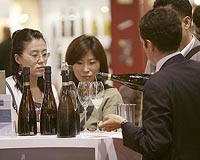| . |  |
. |
Frankfurt (AFP) Dec 27, 2010 Europe's industry commissioner Antonio Tajani urged Monday in an interview that strategic sectors be protected against foreign takeovers, in particular by China. Europe should establish "an authority tasked with examining foreign investments in Europe" using the the Committee on Foreign Investment in the United States as a model, Tajani told the German business daily Handelsblatt. "Chinese companies have the means to buy more and more European enterprises with key technologies in important sectors," Tajani noted. "It is a question of investments but behind that there is also a strategic policy, to which Europe should respond politically," the Italian added. A European authority would determine "if the acquisition (of a company) with European know-how by a private or public foreign company represented a danger or not," the commissioner said. China said last week that it could invest in European sovereign debt to help the eurozone come through a crisis, and Chinese companies are keen on buying others in Europe, one example being the purchase of the Swedish carmaker Volvo by Geely. But German Economy Minister Rainer Bruederle warned European countries against taking "hasty actions" in placing controls on foreign investment. "Of course one can have an evaluation procedure taking into account security and public order concerns. But we shouldn't take hasty actions," Bruederle was quoted as saying by Handelsblatt. "Europe profits from the openness of its markets and offers attractive conditions for foreign investors," he added in comments to be published in Tuesday's edition of the newspaper.
earlier related report Hotel Drouot, one of the French capital's top auction halls, recorded its top sale of the year on December 14 when an 18th-century Qing Dynasty (1644-1911) vase sold for 5.5 million euros (7.2 million dollars). The porcelain vase with the imperial mark of Yongzheng (1723-1735) had been used as a lampstand and the owners had no inkling of its true worth. It had been valued at between one million to 1.5 million euros, but a Chinese collector in the auction hall walked away with the piece far above this price. Christie's France sold a jade brush pot from the Qing Dynasty for 3.3 million euros, a record for the type of object and well over the valuation of 150,000 to 200,000 euros. At Sotheby's, a Hong Kong dealer picked up a porcelain Buddha from the reign of Qianlong (1736-1795) for 589,000 euros -- more than ten times the estimated price. Nor are Asian dealers and collectors content with conducting their business by telephone bid. More often than not in Parisian auction halls, a clutch of Asian bidders can be seen, catalogues in hand. At Hotel Drouot on December 15, a group of about 15 Asian buyers attended a sale of furniture and curiosities by the Camard house. A Qing-dynasty Ruyi sceptre, with ornate wooden carvings with a Buddhist motif, was the subject of a heated bidding war. Initially estimated at up to 8,000 dollars, the winning bidder paid 64,000 euros, before being applauded heartily by his compatriots. "The Chinese are hungry for art works from their country, which the Cultural Revolution denied them," said Francois de Ricqles, the president of Christie's France. The Cultural Revolution, which lasted from 1966 until Chairman Mao Zedong's death in 1976, witnessed a massive campaign of destruction of China's heritage. At a December 15 art auction by Christie's France, mainland Chinese accounted for 35 percent of bidders and 75 percent of value. Hong Kong bidders recorded 9 percent of sales, and Taiwanese 2.5 percent. Three years ago, Sotheby's France did not organise any Asian art auctions in Paris: but now it is its third biggest business, with sales of 25.9 million euros in 2010. "There are lots of Asian objects in Europe. In the 19th and 20th centuries, there was a real taste for this type of art," said Guillaume Cerutti, the head of Sotheby's France. The appeal of Asian heritage in Europe is its authenticity, with forgery a major problem in domestic markets, said Mathilde Courteault, the head of Asian art for Christie's France. "When the provenance of the object is impeccable, when it has stayed in the same family for decades, this has a strong appeal," she said. "This is the guarantee that it is authentic," Courteault said. According to an Asian art expert, who would not be named, Chinese buyers are moved by more than merely nostalgia. "For Chinese buyers, art is an investment. They are not doing this to reclaim their heritage," said the expert, who noted that Chinese museums were not involved in acquisitions.
Share This Article With Planet Earth
Related Links Global Trade News
 Six detained in chemical wine scandal in China: state media
Six detained in chemical wine scandal in China: state mediaBeijing (AFP) Dec 27, 2010 Six people have been detained, several wineries shut down and bottles pulled from shelves in China after authorities found wine containing several chemical additives, state media said Monday. The incident in Changli county in the central province of Hebei - an area dubbed "China's Bordeaux" - is the latest food safety scare to rattle consumer confidence in a country still reeling from a de ... read more |
|
| The content herein, unless otherwise known to be public domain, are Copyright 1995-2010 - SpaceDaily. AFP and UPI Wire Stories are copyright Agence France-Presse and United Press International. ESA Portal Reports are copyright European Space Agency. All NASA sourced material is public domain. Additional copyrights may apply in whole or part to other bona fide parties. Advertising does not imply endorsement,agreement or approval of any opinions, statements or information provided by SpaceDaily on any Web page published or hosted by SpaceDaily. Privacy Statement |